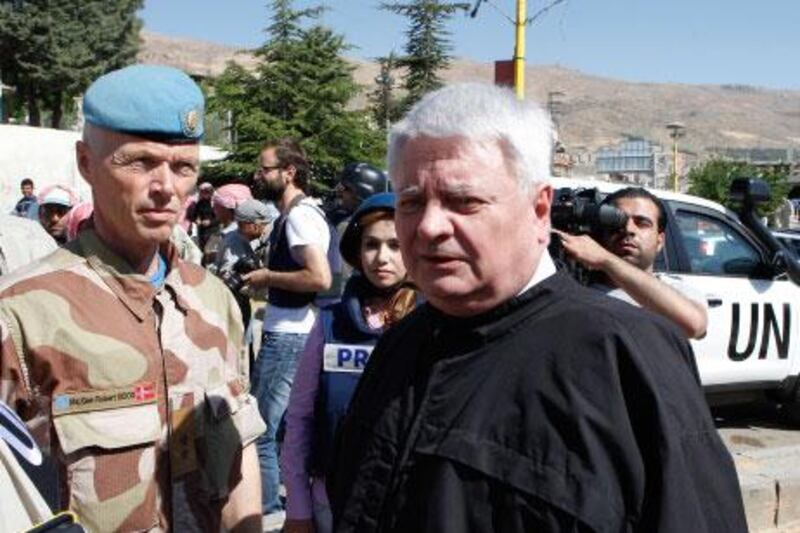NEW YORK // There are no viable options left for the United Nations to stem the escalating violence in Syria, a UN official privately told the Security Council in New York late yesterday.
Herve Ladsous, the head of UN peacekeeping, told the Security Council that 300 UN unarmed monitors would unlikely have their mission extended when it expires next month barring a miracle. And he said an option being discussed to deploy 3,000 armed UN peacekeepers to protect them was not feasible, according to two Security Council diplomats present at his closed-door briefing.
Mr Ladsous, who last week said Syria was in a civil war, said flatly that there is no viable plan for the UN to stop the escalating violence, the diplomats said.
"One extreme option is not having any mission at all, and the other is a full fledged mission with a protection element with 3,000 peacekeepers," one of the diplomats said. But such a mission would require approval by Damascus, the procurement of hard-to-find new troops and there was a risk of angering the opposition if the peacekeepers were seen as protecting the status quo of President Bashar Al Assad's rule, the diplomats said.
Mr Ladsous said extending the mandate of the observers' mission when it expires on July 20 was not feasible because the violence that suspended its activities over the weekend would likely continue, the diplomats said.
UN Secretary-General Ban Ki-moon is to formally present at least these two options for the UN's future plans in Syria to the council on July 2.
"With the situation as dynamic and fluid as it is, who can tell what options are feasible?" asked one of the diplomats. In the meantime there are no new ideas to end the escalating crisis, he said. "The Security
Council discussions today were more of the same. That is what made it so depressing," he said. "How can the council move ahead always saying the same things?"
Norwegian Major General Robert Mood, commander of the unarmed observers, suspended their operation on Saturday citing burgeoning violence that has engulfed the monitors in daily attacks on their vehicles.
Though the general informed the Security Council that his observers had been fired on ten times last week, he told reporters after he also briefed the council that no one incident had led him to suspend the mission.
Gen Mood said he was daily reviewing whether to resume the monitoring but said there must be a "significant reduction in violence", and a commitment by both sides to observers' freedom of movement, which he said had so far only come from the government.
Discussions in local areas might lead to a return to monitoring on a piecemeal basis he said. No new mandate for the monitors had been discussed by the council, he said.
"The focus of the advice I'm giving is how can we best serve the Syrian people, to reduce the violence and suffering," Gen Mood said. "The discussion should not be about the mission in itself and if we make changes it must be to best serve the people."
"The violence is a disrespect for the Syrian people," he said.
Mr Ladsous, who had already reported two weeks ago "daily incidents" of shots fired at UN vehicles, told reporters after briefing the council that special envoy Kofi Annan's six-point peace plan remains the framework for a political settlement and that there was still no "plan B."
He said publicly that the time had not come to change the observers' mandate or to decide to pull them out all together. A number of diplomatic initiatives must play themselves out and the Security Council is waiting for recommendations from the UN secretary-general, he said.
Bashar Ja'afari, the Syrian ambassador to the UN, told reporters his government had tried many unilateral ceasefires that were used by the rebels to procure new arms. He accused Qatar, Saudi Arabia and Turkey of purposefully undermining the observers' mission by supplying these weapons to the opposition.
"They are providing weapons, sending in Al Qaeda, giving them haven, allowing them to cross the border with Syria and then run back to neighbouring countries, " Mr Ja'afari said. "This is becoming so blatant and flagrant, it is too much."
"Some parties are betting on the failure of the mission and are doing their best to create the failure of this mission" in order to bolster talk of military intervention by the West, he said.
foreign.desk@thenational.ae





